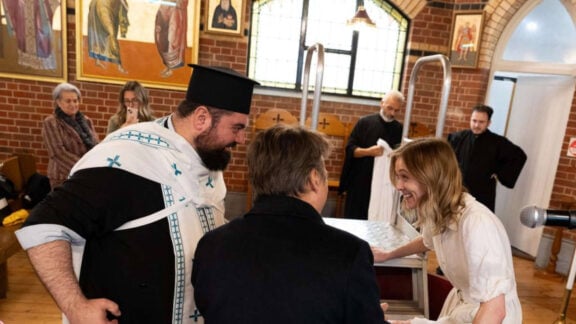Jason Fotilas, the Greek Deputy Minister of Culture, is in Australia to mark the centenary celebrations of the Greek Orthodox Church and Patriarch Bartholomew’s visit.
On Friday, the Greek Consulate in Sydney hosted a roundtable discussion with the minister and members of the Greek Australian media.
Among the key issues raised were the unification of the Parthenon Sculptures, the promotion of Greek language learning, and the recent controversy surrounding the Greek Film Awards, which Variety described as a “fiasco.”
Greek Oscar selection fiasco
Neos Kosmos asked the deputy minister about his decision to disband the Greek Oscar selection committee, described as a “fiasco” by Variety. Fotilas said an email inviting creatives onto a committee, was sent by an official from the ministry without approval.
“It was an irregularity, in fact, an illegality, by an official of the ministry, who is now facing disciplinary review,” said Fotilas.
In August, four Greek film industry professionals received an email invitation from the Greek Ministry for Culture to serve as the selection committee for the country’s film submission to the Oscars. Film critic Leda Galanou, actor Kora Karvounis, screenwriter Kallia Papadakis and filmmaker Vasilis Kekatos all accepted and then received online links to view this year’s selection of films.
Two days later, the committee received another email from the ministry informing them that their appointment was communicated “inadvertently” and had “not been finalised”.
A new committee of seven members was formed and announced by the Greek government. The decision saw creators of 23 out of the 25 Greek candidate films withdraw from the Oscar race in an open letter to Minister for Culture Lina Mendoni and deputy Fotilas.
“That had never happened before when an email had been sent to some people invited to sit on a committee, and that somehow that was all that was needed was for the minister to know – I could not tolerate it,” Fotilas said.

The deputy minister laid the blame squarely on a lack of process and “revealed a need for legislative change.”
He added that the selection committee candidates “had to be members of the Greek Film Commission,” and the people invited were not. Fotilas said all recommendations of who is selected on the committee must come to him first as part of an established process.
Contrary to accusations that the government favoured certain films, Fotilas said that it was “not the job of the minister of the day” to select films. He said ministers are “not the worthiest or most qualified to judge the artistic merit, that is why he or she appoints a committee.”
“The job of selection belongs to the art world, and the law that will soon change will give that opportunity to the art world itself – academy, actors, writers, directors, producers – they will decide, not an employee deciding on Sunday afternoon from their home.”
Fotilas recognised that “some producers have decided to withdraw their films” from the Oscar selection process and said the process was now legitimated.
“The Commission did its job in the end, and the ‘Murderess’ by Eva Nathena is the project that will represent us, and we wish her good luck.”
The Greek film industry is entering a new era
The deputy minister then talked about the new Hellenic Film and Audiovisual Center, which brings together the Greek Film Center, formerly responsible for domestic production, and the National Center of Audiovisual Media and Communication (EKOME) and manages the country’s 40 per cent cash rebate scheme.
Fotilas said the change will allow for “major productions from abroad in Greece and enable Greek producers to create new works”.
Greece is investing heavily in becoming a major filmmaking hub in the Southeast Mediterranean.
“We have funded 200-290 million euro to the National Film Centre for Greek films only.
“Eligible productions, which will travel around the world and to all the festivals all this part we need to strengthen it and make it even more reliable, constructive, and effective.”

Asked about how Greece can create more contemporary cultural exchanges with Diaspora and mainstream arts institutions, such as Mario Banushi’s, ‘Goodbye, Lindita’ by the National Theatre of Greece and presented at this year’s Adelaide Arts Festival, and the corresponding visit of Yiannis Moschos, then director of the National Theatre, Fotilias replied, “Sadly, Mr Moschos did not renew his contract”.
“Everything has an economic impact” said the deputy culture minister, then asked, “So spend more on contemporary culture, which is always based on classical culture? That’s where we start from, but yes, other things are going on.”
He went on to say that contemporary creative programs can be strengthened “either by cooperating with abroad or presenting as much as we can in international festivals.”
Progress on the Parthenon Sculptures
On the matter of the Parthenon Sculptures, Fotilas said: “We are moving forward- we are closer than ever. There is a serious effort on both sides.”
He called for unity and said the work to be done must not be “oppositional or in a partisan way.”
“The British Museum is with us more so than its British government.”
Fotilas did not reject the idea proposed by the British Museum that the Sculptures return to Greece for 20 years if Greece does not have to give up its claims to the ancient works.
“If someone told me that the sculptures would come to Greece for 20 years without me saying that I was giving up my claims, I would never say no.”

Keeping Greek alive is number one priority
“The number one issue is keeping our language alive”, the deputy minister said, adding, “Because language is a part of the life of our culture, it’s the Greek language.”
He praised the “Church which has worked with the Greek state” on keeping Greece alive but said the Greek state now “must take steps.”
“The Greeks of Australia cannot do it all on their own; we must give them something, now.
“The period of the Greek Financial Crisis is over; we are entering normalcy, so we must send teachers and professors who will promote the Greek spirit and the Greek culture and keep the Greek language strong.”
Fotilas said that “about half a million people of Greek origin live here, but not even half of them speak Greek.”
He then emphasised that he was new to the ministry but said that Minister of Culture Medoni wants to work on this issue.
“Of course, other ministries are also needed here – this is not just the ministry of culture to do this work, but I promise to move on this and support the effort.
Fotilas also said “support” for the Greek language “with money” from the Greek state “so far, has not been done.”
“The things [Greek Australian communities and language schools] are asking for are not bad, they are simple things, and we should support them.”
The Greek government’s renewed commitment to supporting the diaspora and preserving Hellenic heritage for generations to come.









